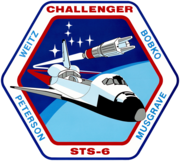STS-6

Challenger begins her maiden flight
|
|
| Mission type | Satellite deployment |
|---|---|
| Operator | NASA |
| COSPAR ID | 1983-026A |
| SATCAT no. | 13968 |
| Mission duration | 5 days, 23 minutes, 42 seconds |
| Distance travelled | 3,370,437 kilometers (2,094,292 mi) |
| Orbits completed | 81 |
| Spacecraft properties | |
| Spacecraft | Space Shuttle Challenger |
| Launch mass | 116,457 kilograms (256,744 lb) |
| Landing mass | 86,330 kilograms (190,330 lb) |
| Payload mass | 21,305 kilograms (46,969 lb) |
| Crew | |
| Crew size | 4 |
| Members |
Paul J. Weitz Karol J. Bobko Story Musgrave Donald H. Peterson |
| EVAs | 1 |
| EVA duration | 4 hours, 17 minutes |
| Start of mission | |
| Launch date | 4 April 1983, 18:30:00 UTC |
| Launch site | Kennedy LC-39A |
| End of mission | |
| Landing date | 9 April 1983, 18:53:42 UTC |
| Landing site | Edwards Runway 22 |
| Orbital parameters | |
| Reference system | Geocentric |
| Regime | Low Earth |
| Perigee | 288 kilometers (179 mi) |
| Apogee | 295 kilometers (183 mi) |
| Inclination | 28.5 degrees |
| Period | 90.4 minutes |
| Epoch | 6 April 1983 |
 L-R Peterson, Weitz, Musgrave, Bobko |
|
STS-6 was the sixth NASA Space Shuttle mission and the maiden flight of the Space Shuttle Challenger. Launched from Kennedy Space Center on 4 April 1983, the mission deployed the first Tracking and Data Relay Satellite, TDRS-1, into orbit, before landing at Edwards Air Force Base on 9 April. STS-6 was the first Space Shuttle mission during which a spacewalk was conducted, and hence was the first in which the Extravehicular Mobility Unit (EMU) was used.
STS-6 was the last shuttle mission with a four-person crew until STS-135, the final shuttle mission, which launched on 8 July 2011. Commander Paul Weitz had previously served as Pilot on the first Skylab mission, where he lived and worked in Skylab for nearly a month from May to June 1973. After Skylab, Weitz became the Deputy Chief of the Astronaut Office under Chief Astronaut John Young. Bobko originally became an astronaut for the Air Force's Manned Orbiting Laboratory program but later joined NASA in 1969 after the MOL program's cancellation. Prior to STS-6 he participated in the Skylab Medical Experiment Altitude Test and worked as a member of the support crew for the Apollo-Soyuz Test Project.
...
Wikipedia

